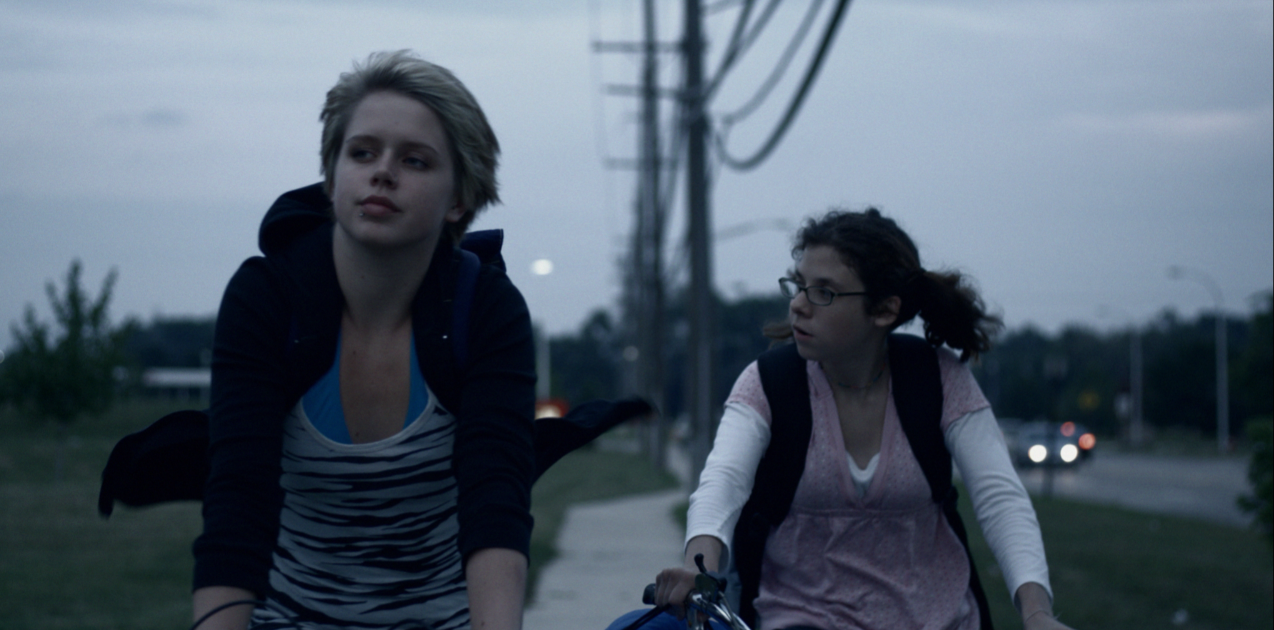Claire Sloma on the Sleepover Cycle

CLAIRE SLOMA, LEFT, WITH ANNETTE DENOYER IN THE MYTH OF THE AMERICAN SLEEPOVER.
Listless teenagers on the eve of school’s return are certainly a trope in American cinema—no need to rattle off all the movies that capture their jittery antics and forlorn anticipation. Not much is different in the action of David Robert Mitchell’s The Myth of The American Sleepover—except when there is. Sweetened with nostalgia, this muted and layered portrait of suburban Detroit replaces the familiar bangs and blows with novice actors, awkward encounters and splintered narratives that aptly describe the common teenage experience. Few of us had the swagger of Ferris Bueller or the privilege of Cher Horowitz—or even the dewy resilience of any Molly Ringwald character—back when acne was unavoidable and lunch tables were cause for panic attacks; and Myth captures the insecurity and desperation for something major to happen without dipping into charitable pity or even campy deference. Perhaps the eerie realism is why critics salivated over the SXSW Jury Prize winner for Best Ensemble Cast and the sole American selection to the 2010 Cannes Film Festival Critics Week. Finally American audiences can jump back into their own adolescence this Friday, July 22nd, when Sundance Selects releases the film nationwide.
And the film also showcases a new talent, Claire Sloma, who won Best Actress both at 2010 Belfort Film Festival in France and the 27th Mons International Love Film Festival in Belgium. Also a Detroit native, Sloma portrays the effervescent Maggie, an incoming freshman who wanders the night on her bike in search of fun, booze, and boys. Yet, clichéd party girl Sloma’s Maggie is not—and the character’s fierce individuality and adventure-seeking strikes a chord with the actress herself. We caught up with the German-speaking former drama geek about being a fresh face in the Hollywood scene and being a jack of all trades in high school.
JULIE BAUMGARDNER: When did you move to LA?
CLAIRE SLOMA: Yeah, I’m getting adjusted. I just moved out here a week and a half ago, and crazily enough, I’ve already had a few auditions since I’ve been out here, which I’m happy about.
BAUMGARDNER: Did you move to LA to pursue acting? As of last year, you weren’t sure if that’s what you wanted to do.
SLOMA: Yep. It was kind of complicated last year when we were in Cannes, because I studying in Germany at the time, and I was hoping to graduate in December, but I didn’t land up graduating until this past April from Michigan. When I was in Cannes, I was met with my manager, and I going back and forth between Los Angeles and Ann Arbor this year, and I fortunate enough to get an agent, too. It’s kind of nice having people who believe in you. I’ve always loved acting and I always did theater, so if I have this opportunity I might as well give it a shot.
BAUMGARDNER: So you came to Myth of the American Sleepover as a total novice and your mother’s friend suggested that you try out—but you did stage work in high school; how did that affect your approach to acting in film?
SLOMA: It’s kind of funny, I recall, I did a couple of auditions with David [Mitchell] and Adele [Romanski], the producer, because I was too theatrical. I didn’t realize how much more subtle acting in film is supposed to be, and thankfully they both were willing to work with me on that, because they saw something else there. Otherwise, they would have been dismissive of somebody who’s only done theater in her life. Oh, the first audition, I don’t even want to see that tape!
BAUMGARDNER: Being untrained in film, how did you prepare for the role?
SLOMA: With the dance scene in the film, I watched clips of Audrey Hepburn in Funny Face to kind of get a feel for that. I love that dance scene in that film. But the best way that I think we prepared was honestly David just talking through scenes with me in a lot of instances, and thankfully I was able to deliver what he wanted and make progress that way.
BAUMGARDNER: Did you relate to your character Maggie? Did you find you inserting your 15-year-old self into her?
SLOMA: Well, I didn’t have those piercings when I was that age, not because I didn’t want them, but it’s more that my mother was like “No,” understandably. But, as a person, I was like Maggie in a lot of ways. I did dance when I was that age; I did lots of stuff like dance, sports, theater, and choir. What I really liked about her character was she stuck up for her relationship with her best friend Beth. That’s how I felt about my friends growing up, as kind of a way to level down all that high school crap or drama that occurs sometimes. When I was in middle school especially, girls had a freaking heyday making fun of me. I think a lot of people go through that experience. Although you don’t see that in Maggie, I feel like if you gave her character a background, it would definitely be there for being an independent individual and sticking out, because she definitely does. That was something I tried to bring to that character.
BAUMGARDNER: How would you describe your 15-year-old self?
SLOMA: I always was top of my class and people would always give me a hard time for being a drama geek, being in choir, but that’s where I had my best friends too. I was friends with people from every freaking clique, but the people in drama and choir were the ones I knew who didn’t give a shit about who I was. I’m eccentric to an extent, but I also was the girl on the Homecoming Court, even if I didn’t really fit in with the popular crowd. I was all over the place, I was hard to pin down.
BAUMGARDNER: How do you think you’ve grown?
SLOMA: Studying abroad in Germany my junior year of high school really made me become more independent, and made me realize I don’t need somebody with me to go do anything. I was there was for 11 months, and when I came back my senior year, I felt like a completely different person. Still, my quirky side was there, but I didn’t feel like I needed approval as much, and I felt more comfortable doing things on my own, something which I think takes most people longer than high school to figure out about themselves.
BAUMGARDNER: I was quite curious about that. Do you think that this could be Anytown, USA and could these characters be the prototypical American teenager experience? Do you think that your character Maggie is representative of the suburban experience of Middle America, or is she specific to Detroit, which is a city that is distinct in its mood or flavor?
SLOMA: I think it depends on who the viewer is. If you grew up in a Midwestern town, I have no doubt that you can identify on various levels with what’s going on in the film, and I’m sure people knew somebody or felt like one of the characters. I know I personally often felt like Maggie growing up, wanting to be part of the older group and being very confident but also being very insecure, too. I wouldn’t put it past anyone. The film has done so well in France and in Belgium, and in other European countries. If they can watch this film and get that same nostalgic feeling from it, that tells me anybody can. Growing up with Europe, I lived in Germany for two years of my life, and I can tell you it’s different. Actually, I was part of the theater club over there. I had a main role, and when I auditioned, I didn’t speak a lick of German. I just memorized the entire piece and did it in front of my younger host sisters and made them give me feedback, and actually got the role for that, which was really a cool experience. I think that helped me learn German a lot quicker, too.
BAUMGARDNER: Are you still pursuing all things German?
SLOMA: I always try my best. My last semester at U of M, I did German theater for my second time, because my German theater professor is just awesome and we performed an entire play in German. That’s one way I’ve always been able to keep up with my German. If you can do theater and know what you’re saying and translate it to the audience through your emotions, then you know the language. It’s fricking hard out in LA but there’s a restaurant called Red Lion Tavern and I love going there, and sometimes I’m lucky, I’ll get these older waitresses and they’ll speak fluent German, being from Germany, and I’m like “Yes, I can order my food in German and make small talk.”
BAUMGARDNER: Would you ever pursue trying to get roles in German films?
SLOMA: Of course! I’d want to be part of something like that, if it were possible.
THE MYTH OF THE AMERICAN SLEEPOVER COMES OUT IN LIMITED RELEASE FRIDAY.






